Interview with Julie Gray
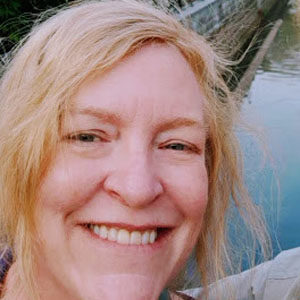
Julie Gray is a wonderfully dynamic, engaging woman with an amazing story to tell! In this interview, Julie takes us from her California roots and her time in LA as a script reader, to her a deep family loss that led her to her new life in Israel. It is there that she met her partner and soulmate Gidon Lev, a vivacious octogenarian who also happens to be a Holocaust survivor–one of only 100 children believed to have survived Theresienstadt. Together they wrote a wonderfully inspiring book: The True Adventures of Gidon Lev. The book has received much acclaim–it received a starred Kirkus review and was listed as one of Kirkus Reviews Best Books of 2020.
Please visit Julie’s or their joint website to learn more. In the meantime, buckle your seatbelts and enjoy!
Diane: Hi Julie, I’m so excited to meet you!
Julie: Me too, Diane. Thank you so much for having me.
Diane: I just want to tell my readers how we met—I love the different ways to connect with people!
Julie: I’ve been a writer and an editor for many, many years now. And whenever I read something or see something and I think it’s really terrific, I let the writer know.
Diane: That’s wonderful.
Julie: And I have received email replies from amazing people, including you. You had written a book review, I thought you wrote so well. I thought, “I got to let this lady know.”
Diane: Thank you!
Julie: I’m a fan of good writing, so I correspond with all kinds of people in this way. Sometimes you don’t hear back, but when you do, it’s really wonderful.
Diane: It is wonderful! But you also shared your wonderful book with me, The True Adventures of Gidon Lev. Gidon’s story is fascinating, but the story of how the book came to be is quite a story too. Would you mind starting by telling us how you got to Israel?
“I Tried to Outrun Grief. It Doesn’t Work Out That Way”
Julie: Oh gosh. I made Aliyah in 2012.
Diane: Could you tell us what Aliyah is.
Julie: Aliyah is a Hebrew word which literally means going up. But in the Jewish religion, Aliyah means returning to the Jewish homeland, which is kind of a mitzvah, a blessing. I’m not religious, so I didn’t really look at it that way. But in layman’s terms it means to immigrate to Israel.
My Aliyah is kind of a sad story actually. (I just wrote an article in the Jewish Journal of L.A. about my backstory.) I made Aliyah in 2012 on the heels of the loss of my brother. I visited Israel about every six months and loved it here, even though I didn’t speak a word of Hebrew. After my brother passed away, I tried to outrun grief. It doesn’t work out that way.
Diane: I love how you put that, “Outrun grief.” If only, if only.
“Living in Israel Has Been the Best Mistake of My Life”
Julie: Yeah, I tried, and it followed me.
Diane: You gave it your best effort.
Julie: Living in Israel has been the best mistake of my life.
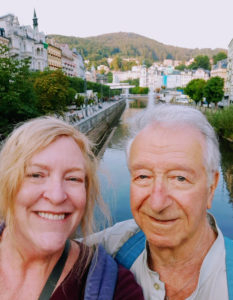 Diane: Oh, I love that too.
Diane: Oh, I love that too.
Julie: You can’t outrun grief. That’s silly. I probably wouldn’t do that again. But I’m so glad I did. I love this country. I’m very, very happy in Israel, especially with what’s happening in the United States right now. Though we have serious problems in Israel, obviously, I feel that Israelis are so bonded and connected as people. I just feel very at home here, so it was the best mistake I ever made.
Diane: Are you fluent now?
Julie: Oh no. I speak Hebrew every day–poorly. I can have great conversations with children who are like eight. I’m a writer and editor and work in English every day. English is my love and my tool and my muse. But that’s a little bit of an excuse. I’m just lousy at languages to tell you the truth.
Diane: It’s hard learning a new language, and they say once you’re past 12 or something, you’re screwed for life.
Julie: Exactly. And when I came to Israel, I was 47 years old. So, I was quite a bit older than the usual person to make Aliyah. I’d spoken some Spanish before when I was living in California. But Hebrew was just a challenge.
Diane: And you’re living in Tel Aviv?
Julie:I live actually in Ramat Gan, which is just outside of Tel Aviv. It’s the nearest suburb, so it’s a lot quieter, and it’s somewhat less expensive.
When I first came here, I lived in Tel Aviv, but two things happened very quickly. For one, it’s just so loud in Tel Aviv all the time. And the other thing was that I really wanted to get to know Israel and Israelis, to see normal Israeli life. Tel Aviv, especially during the summer, used to be so full of tourists all the time. Tel Aviv is not a typical Israeli city.
“I Wanted to Be in L.A. Because I Was Interested in the Entertainment Industry”
Diane: Were you were born in LA?
Julie: No, no. I’m actually from far northern California, very small rural town. But I was in L.A. for about 10 years after I was divorced. I was a stay-at-home mom for years and wrote little articles in this early thing called the Internet. I wanted to be in L.A. because I was interested in the entertainment industry.
So, I went to this really specialized program called the Writers Bootcamp in Santa Monica for screenwriting. I actually won a two-year program there through a competition for my writing. So that was pretty great.
Diane: Woohoo! Look at you.
Julie: I was a divorcee and needed to start earning a living. I heard that producers and production companies would pay you money to read scripts to evaluate them. So I said okay, got on the phone, and called a few production companies. I said, “I’m just learning how to do this. Can I just come by your office and pick up some scripts, and I’ll just read them for free and learn how to do that?”
And so, I just started doing that, but I was really good at my evaluations apparently because very quickly, I was working for all kinds of production companies. I even worked for Hugh Jackman for a while reading scripts and manuscripts.
Being a script reader sounds pretty cool, and it is cool. I really enjoyed it and learned so much, but in the ecosystem of Hollywood, it’s a pretty lowly position. Still, it teaches you a lot about how decisions are made, about which movies to make, and also about the politics of Hollywood. It was eye-opening.
Diane: I am sure. And exciting and fun. You wrote a book about that?
Julie: Oh yes. I wrote a book about that called Just Effing Entertain Me: A Screenwriter’s Atlas.
Diane: Oh, I love that.
“I Poured Myself into His Book Because His Story Just Animated Me”
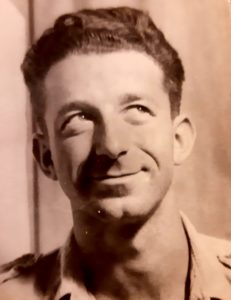 Julie: Unfortunately, the book came out right after my brother took his life in 2010, which I’ve written a lot about. I wrote for a year “Grieving Suicide” in the Huffington Post. His death was so shocking to me that I just lost all of my desire. I didn’t care about the book anymore and didn’t market it. But people who read it really love it.
Julie: Unfortunately, the book came out right after my brother took his life in 2010, which I’ve written a lot about. I wrote for a year “Grieving Suicide” in the Huffington Post. His death was so shocking to me that I just lost all of my desire. I didn’t care about the book anymore and didn’t market it. But people who read it really love it.
Diane: What I can tell from your energy and what you’re saying is that when you see something you want, you go and get it, right? Were you always a go-getter? Do you think of yourself as fearless or as someone who’s afraid and does it anyway?
Julie: A combination. After my brother died, and I came to Israel, I was so grief-stricken I just didn’t care. I knew that moving to Israel was a big risk and that life in Israel could be itself dangerous at times, but I just didn’t care. I was so gutted. Now, thank God, through this book that I’ve written about Gidon and my relationship with him, I’ve come back to caring very much.
Diane: That’s wonderful.
Julie: I was about half-way through writing this funny memoir called They Do Things Differently Here about moving from Hollywood to Israel when I met Gidon. And I poured myself into his book because his story just animated me. And now I’m going back to my book, which is in a way sort of a sequel to Gidon’s book even though the events took place before I met him.
Now I can look back with new eyes.
Diane: I would love to see that. Tell us how you met him and how that led into the book. You said after your brother’s death, you didn’t care. And then here’s Gidon who has been through—
Julie: He has taught me so much.
Diane: I would imagine you taught each other. But let’s hear about how you met.
“He Was a Holocaust Survivor, He Needed Help with His Book, and Would I Meet Him for Coffee?”
Julie: Of course, I used to run the Tel Aviv Writer’s Salon here in Tel Aviv, a weekly writer’s group. I met some writers and other editors, and one day my phone rang. And this man said his name was Gidon. He was a Holocaust survivor, he needed help with his book, and would I meet him for coffee? I thought, “Well, he sounds adorable, but there’s no way I’m going to work on his book because I’m not qualified. I’m not a Holocaust scholar or a historian. I don’t do personal stories.”
But, I thought I could meet him for a cup of coffee. Maybe he’s just lonely.
Well, he swept into the café. He looked like a petite version of Fred Astaire with white hair and his blue eyes, and I was like, “This guy is hilarious and charming.” He made me laugh. The minute I met him, I knew he’d be a new friend. This was not going to stop at this coffee.
He told me all about himself. And I told him that was so interesting, but I could not take the job. And then a couple days later, I thought, “I wonder if Gidon would like to have a cup of coffee.” So I called him, and he answered immediately and said, “I’ll be there in 30 minutes.” So, I hurried to the café, and that was the beginning.
But I had no intentions of working on the book because I just wouldn’t have known where to begin really.
Diane: And then?
Julie: Joke’s on me because … I turned him down, but he just wouldn’t take no for an answer. So, we started dating. We started grocery shopping together, and we would go to the movies together.
Gidon would come to my apartment and say, “Oh, that shelf is not in the right place,” and he would fix it. But during this time, he kept talking about the book and talking about the book. And I felt so guilty. I thought, “There are so few Holocaust survivors left in the world alive who can talk about it, who want to talk about it; I have a responsibility here.
“The Word That Comes to Mind is ‘Soulmates'”
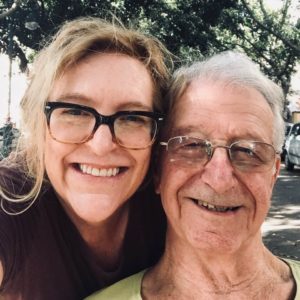 I put out a request on an online writers’ group I belong to and got about 16 volunteers. We formed our own little private Facebook group called the Gidon Project. We had writers and volunteers in that group from India, England, Seattle, New York, L.A, Australia, all over the world, Jewish and non-Jewish, who helped me corral the source material. That’s what they were doing.
I put out a request on an online writers’ group I belong to and got about 16 volunteers. We formed our own little private Facebook group called the Gidon Project. We had writers and volunteers in that group from India, England, Seattle, New York, L.A, Australia, all over the world, Jewish and non-Jewish, who helped me corral the source material. That’s what they were doing.
Diane: That’s amazing.
Julie: Gidon had written some 60,000 words of source material but didn’t organize or date it. So, these ladies and one gentleman stepped in and took pieces of it. When their part was over, I thought, “Oh no, now I really have to do this!”
Diane: Everyone gave their time. Now you’re stuck.
Julie: That was one thing, and it was wonderful. But it was only step one.
Diane: You said you started dating. What’s the age difference between you two?
Julie: 30 years. Actually 29 years.
Diane: Twenty-nine years. When you say dating—going to the supermarket, fixing your shelf—was it mostly friendship at first and then-
Julie: That’s such a good question. The word that comes to mind is soulmates.
Diane: Soulmates.
Julie: It wasn’t dating like, “Oh, do I look nice enough for him? Or is he going to like me? Is he going to call me back?” The minute we met each other, we just said, “I like being with you.” And that was it.
Diane: And that was it.
Julie: I call him my loving life buddy. We are a couple. We’re not married, but we are a couple.
Diane: And you live together?
Julie: Yes, I moved in with Gidon probably about nine months after we met. My lease was up, and he had this place. And I was always here anyway.
Diane: That’s wonderful.
“Of the 15,000 Children Imprisoned In Or Transported Through Theresienstadt, Only 100 Are Thought to Have Survived. Gidon Is One of Those Kids”
Diane: Tell us a little bit about him.
Julie: He is very much a Peter Pan figure.
Diane: That’s a great way to describe him.
Julie: He is, and I do think it’s because his childhood was spent living in a kind of feral existence.
Diane: Explain what his childhood was like.
Julie: Gidon spent, from the ages of six to ten, in the Theresienstadt Nazi concentration camp, from 1941 until liberation in 1945. His mother was a slave laborer in part of the camp, and so was his father. But his father was put in separate barracks. Of the 15,000 children who were imprisoned in or transported through Theresienstadt, only 100 are thought to have survived. And Gidon is one of those kids.
When he was liberated, he was incredibly malnourished and very sickly. He spent about four weeks in a Russian recuperation center where he was fed very carefully to get him back on his feet, as were the other kids. When you remember your childhood, you remember bubble baths and your guinea pig and riding your bike. That whole chunk of life didn’t happen for him. He was shot at by Nazi guards. He was starved. He saw dead bodies every day. That was his childhood. He didn’t have a birthday party.
Diane: What did the kids do in the camps? They couldn’t do much work.
“Theresienstadt Is the Only Ghetto That Was Not Liquidated”
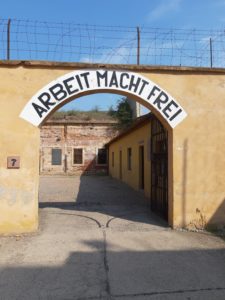 Julie: They were divided. There was a Jewish committee of elders made by the Nazis to administrate the camp. It’s happened in many other concentration camps, the Jews had to administrate themselves, which is another part of the sick cruelty of it. In Theresienstadt, the committee of elders felt that if the camp were a productive one, the Nazis would spare the camp. And in fact, Theresienstadt is the only ghetto that was not liquidated.
Julie: They were divided. There was a Jewish committee of elders made by the Nazis to administrate the camp. It’s happened in many other concentration camps, the Jews had to administrate themselves, which is another part of the sick cruelty of it. In Theresienstadt, the committee of elders felt that if the camp were a productive one, the Nazis would spare the camp. And in fact, Theresienstadt is the only ghetto that was not liquidated.
The committee of elders said, “If we can just run a tight ship and be really organized and have everybody work really hard, they’ll spare us.” Theresienstadt was a propaganda tool for the Nazis. Hitler wanted to show the world that he’d created this lovely town just for Jews—only they can’t leave, and there was crematoria.
He needed to have some kind of façade that would make it look like a real town. The committee of elders took the children 12 and up into something Kinderheims, which were sort of little schools. So They lived in barracks separately from their parents. And they drew, and they had plays. And they read, and they wrote. And some were even secretly taught Torah in that time.
A lot of art has come out of Theresienstadt, and the children of Theresienstadt are very famous for this reason. Younger children stayed with their mothers, who tried to organize, “Well, you stay with us one day and watch the kids.” But there were too many kids to watch, so the kids were quite feral. They just ran around the camp. If they did little favors for the Nazi guards, they would not get beaten.
Gidon learned how to help with the potatoes or the bread, so he would get an extra bite and not to be beaten. He groomed the Nazis’ horses. The little children were sort of little wild children, and I think that has a lot to do with Gidon’s personality today. It’s this sad Lord of the Flies childhood that he had where there was a lot of violence. He saw people get hung. Gidon remembers that, but he didn’t process the Holocaust the way an adult would. He didn’t know that this was not normal. It just was his childhood.
“In Order to Bring That Story Forth, He Needed a Co-Writer”
Diane: And I would imagine it takes the rest of your life to process a lot of that.
Julie: I think so.
Diane: And I would imagine that the book project helped a lot with that.
Julie: I don’t think he realized when we started working on it together. His first thought was he’d just written all these journals, and he wanted to just spell check it and publish that, and that thousands of people would read it. Being an editor and having worked in Hollywood, I had to disabuse him of the idea that every detail of his life would be fascinating. The bulk of what he wrote was not about the Holocaust. It was just about his life after that.
He knew his story was bigger than that, but in order to bring that story forth, he needed a co-writer, someone to be the narrator who would put his story in context. I don’t think he realized what he was in for. Of course, neither did I. I think there were times when it was really hard for him.
Diane: I’m sure.
Julie: Reading his mother’s testimonial was very painful. Rethinking the loss of his second wife, going over his battle with cancer. But I think he got some clo … it was a big reckoning for him.
I, on the other hand, had never met a Holocaust survivor. I have no family members that were affected. It was an awful rite of initiation for me. I wasn’t a Holocaust scholar but decided I had to become one. So, I read every book. Watched every documentary about every camp, and for me, it was a certain kind of trauma from it. I have nightmares about the Holocaust that I never did before.
Diane: That’s so interesting. I have two comments. One is I love that you almost said “closure,” but you stopped and said “reckoning” instead. It’s such a better word. That closure word makes no sense to me. I think anyone who’s suffered tremendous loss knows that closure is not a thing.
Julie: That’s right.
Diane: But reckoning is.
Julie: That’s exactly why I paused there.
“And I Was Floored That in 2020, My Child Feels That Her Being Jewish Is Something She Doesn’t Necessarily Want to Advertise”
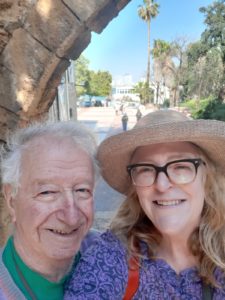 Diane: So, that was great. And … Are you familiar with Camp Ramah?
Diane: So, that was great. And … Are you familiar with Camp Ramah?
Julie: I’ve heard of it.
Diane: It’s a Jewish religious sleep-away camp I went to. We learned a lot about the Holocaust at a young age, and it’s almost like I think we all have trauma being exposed to those horrors, even through watching others from the distance of time and space.
Julie: In that article, I talk about the fact that I converted 36 years ago and raised two Jewish children. When they were in Hebrew school and said, “We’re talking about the Holocaust,” I thought, “No, they’re too young. You can’t expose them to this.” But that was the way it was done. And once it’s in your mind, it can never leave you.
Diane: Can never get it out of your mind, and whenever I hear anti… I mean, there’s so much anti-Semitism in the world today … I get nervous. I’m nervous about all the hate that’s out here. Hate scares me.
Julie: My daughter who lives in the Bay Area said to me recently, “Well you know mom, the good thing is I can pass as not Jewish.” I said, “What? Is that something you think about?” And she said, “Yeah. People don’t necessarily know that I’m Jewish.” And I was floored that in 2020, my child feels that her being Jewish is something she doesn’t necessarily want to advertise. I almost fell out of my chair.
Even when I converted, about 34 years ago, the Holocaust seemed like a long time ago and that it would never, ever, ever happen again. Anti-Semitism was not completely over. You heard this odd comment, but it was inconceivable that the stuff that’s being said today is happening, inconceivable in 1986.
We’ve taken a major step backwards.
Diane: Did you convert for marriage?
“I Had No Idea the Treasure Chest That I Was About to Open”
Julie: Yes. I fell in love with this really handsome, smart, intellectual Jewish guy from L.A. And he was really assimilated himself. But we got engaged, and when it came time for the wedding, well, he wanted a chuppah, and he wanted to step on the glass. And so, I said okay. I didn’t know anything about the Jews at all. I’d seen Fiddler on the Roof, and I thought, “They seem like terrific people. Great.” I had no idea the treasure chest that I was about to open, no idea. And that’s the meat of my article. The greatest gift of my life was my conversion. Even though my marriage ended, Judaism has saved my soul, and I’m not religious. I just mean in terms of the culture, the tradition.
Diane: When we first started talking through email, you said it was hard to garner interest for the book. You pitched it, and nobody wanted Holocaust stories. I was shocked because Holocaust literature is such a genre.
Julie: There were two problems: one, the word Holocaust. When a literary agent hears that word, they go, “Okay. It’s going to be sad. It’s going to be serious. It’s going to be difficult.”
So, that word. I had to use in the title because the Holocaust is a huge part of the book. The other problem I had was that I used a meta device. In many parts of the book is the story about the book.
I just couldn’t get that across to people and/or they couldn’t imagine what that would mean.
Diane: This is not a traditional Holocaust book.
Julie: Gidon’s story and my story overlap in many ways. I’m 30 years younger. I’m from California. To me, Israel is this new country, and here’s a person on the other end of the spectrum, much older, a European, a person who had suffered in the Holocaust, and a true Israeli; he helped build the country. And so, the conversations that we had between us were more interesting than just his straight narrative or just my narrative. The interplay between the way he sees things and the way I see things added a depth to this story.
“It Was a Very Unusual Way to Write a Holocaust Book”
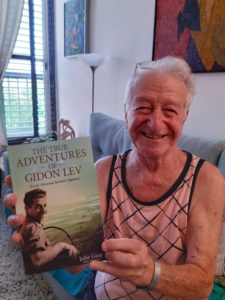 And then, he is just such a tremendously funny person. I wrote about this in the book. At 3:00 in the morning, Gidon vandalized a Ben Netanyahu billboard. We drove past it one day, and he said, “I’m going to write on that.” And I said, “Oh Gidon, what are you talking about?” And a couple days later, there was a can of spray paint on the coffee table. And a couple days later, he came into bed at like 4:00 in the morning, reeking of spray paint.
And then, he is just such a tremendously funny person. I wrote about this in the book. At 3:00 in the morning, Gidon vandalized a Ben Netanyahu billboard. We drove past it one day, and he said, “I’m going to write on that.” And I said, “Oh Gidon, what are you talking about?” And a couple days later, there was a can of spray paint on the coffee table. And a couple days later, he came into bed at like 4:00 in the morning, reeking of spray paint.
The book would be so much paler without the presence of the contemporaneous Gidon. So, it was a very unusual way to write a Holocaust book.
Diane: You also include history for context.
Julie: I am a huge fan of history, and I’m a huge fan of sidebars. A lot of people see history in these silos. There were the Napoleonic wars, and then other things happened after that, and then others, as if things don’t overlap. But at the same time as the Napoleonic wars, the first oil well was discovered in America.
It bothers me that people don’t see things happening at the same time and affecting each other, particularly when it comes to Israel. People are so hard on Israel in the world. And yet, if you ask them about the British mandate, they aren’t familiar with it. They don’t know what that is.
Israel did not drop out of the sky in 1948. Zionism and the idea of the state of Israel was around for centuries, but Zionism as a 19th century ideal and a political movement started in Russia with very specific people with very specific non-religious goals.
The book to me is like a Trojan horse. So, you’ve got this Trojan horse, and there’s Gidon. And he’s charming and funny. And he’s a Holocaust survivor. But when you open up the horse and go in, you’re going to learn some history about Israel, some history about the Second World War, some lessons about narratives and how we create them.
“I Really Had in Mind a Non-Jewish Audience, People in North America Who Like Israel. Maybe They Hate Israel”
Diane: Where would you find this on the bookshelf?
Julie: History, biography, Jewish Studies. I really wrote the book for a non-Jewish audience. I mean, I wrote it for everybody who will read it, but I really had in mind a non-Jewish audience, people in North America who like Israel. Maybe they hate Israel. They kind of know about the Holocaust. They’re not really sure, but they like a good story and one that they could really talk about with their book club.
Diane: Have you thought about doing a U.S. synagogue tour?
Julie: That’s what I was planning to do before the pandemic. I was going to just literally rent a car, ship myself 150 books, and hit the road. I thought it would be fun. Now we can’t do it.
Diane: Forget about 150 books. You could do the synagogues on Long Island where I live and go through more than that. People would be fascinated. I know you were also interested in reaching a non-Jewish audience. How about libraries?
Julie: We have a couple of Zoom things lined up.
Diane: Zoom things, wonderful. I hadn’t thought of the Zoom thing.
Julie: And the great thing about doing it on Zoom now, is that Gidon can do that. A road trip in the States would’ve been too much for him. He’s a really healthy person, but he’s 85. He’s great on Zoom!
Diane: What’s next for you?
Julie: I’m going to return to my memoir They Do Things Differently Here.
Diane: I love that title.
“The Sound Editor for the Audiobook’s an Academy Award Winner”
Julie: Thank you. It’s a riff on a quote that says, “The past is a different country. They do things differently there.”
I love that title because in Israel, it’s such an understatement. Oh my God. So, I’m going to go back to that book, but I am also a developmental editor. I work with writers and their books. That’s my bread and butter. And I’m writing a lot of articles about Gidon’s book, various angles about it, for publication.
Diane: That’s great.
Julie: I would love to do speaking engagements about his book, about the process of writing it, and about the history in it. Gidon is a guest on a big podcast next week, and I’ve helped write the script for that. And the audiobook of his book will be coming out, I think, November 1st.
Diane: That’s wonderful.
Julie: The sound editor for the audiobook’s an Academy Award winning sound editor who heard about us on Facebook. Gidon has a small measure of notoriety on Facebook. People know Gidon and Julie. I put on Facebook that we wanted to make an audiobook, and we got this amazing… I mean, she did On Golden Pond and New York, New York with Liza Minnelli. This project has been blessed in many ways.
Diane: My last thing that I want you is what has life after 50 been like for you.
“If My Brother’s Death Marked the End of My Life in Some Way, the Publication of Gidon’s Book Has Marked a New Beginning”
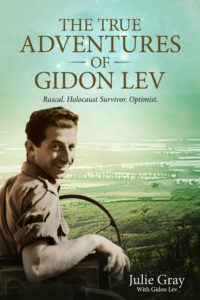 Julie: My brother’s death was the defining event of my adult life. I feel like I lost a decade because of that really. I can’t emphasize that enough. But on the happier side, I wrote an article called “The Freaking Autumn of My Life” about coming to grips with turning 50 that was published in the Huffington Post. It’s very silly, like, “I’m a Smiths fan. How can I be turning 50? I used to ride a moped.” The article was included in an anthology called Aging: An Apprenticeship, along with work by Judy Blume, Richard Hall, and Gloria Steinem. And the editor calls me and said, “I want to include this.” And I said, “Are you crazy?”
Julie: My brother’s death was the defining event of my adult life. I feel like I lost a decade because of that really. I can’t emphasize that enough. But on the happier side, I wrote an article called “The Freaking Autumn of My Life” about coming to grips with turning 50 that was published in the Huffington Post. It’s very silly, like, “I’m a Smiths fan. How can I be turning 50? I used to ride a moped.” The article was included in an anthology called Aging: An Apprenticeship, along with work by Judy Blume, Richard Hall, and Gloria Steinem. And the editor calls me and said, “I want to include this.” And I said, “Are you crazy?”
Diane: Woohoo! Look at you.
Julie: But when I read that piece now, at 56, I think, “Oh, calm down about turning 50.” You can be a person who likes the Smiths or R.E.M. and be 56. I was engaging in my own self… “Oh, I’m over 50, so life doesn’t matter anymore.”
I don’t regret the piece. It’s still very funny to me, but now I feel differently about it. The book is organized by decades—writers in their 50s, 60s, 70s, 80s, 90s. The older contributors wrote wiser more beautiful reflections than the younger writers.
Diane: I’m getting that book.
Julie: I think if my brother’s death marked the end of my life in some way, the publication of Gidon’s book has marked a new beginning for me. It really has. It was my brother’s death that brought me to Israel, and that’s when I met Gidon.
Gidon’s birth name was Peter, and that was my brother’s name. So, there’s a circularity and grace in my relationship with Gidon and with this book.
Diane: And it’s a beautiful book and a beautiful story. It made me want more, so I’m very excited for the memoir and to read some of your other clips.
Thank you, Julie. This was so much fun and such a pleasure to meet you.
As always, I’d love to hear your thoughts! Please leave a comment or send me an email.
And see you next year!
XOXO
Diane



I was glued to the screen reading this interview. My eyes opened wider when Julie said that the conversations between her and Gidion were far more interesting than just straight narrative. I am so glad that she is a writer and discerned this and I am very eager to read the book. And hopefully, her memoir will be published soon. I can’t imagine being grief-struck and moving to another country. It speaks to me of her strength and desperation. I envy you getting to interview her!
I also want the book Aging: An apprenticeship!
Thanks, Nicky! Interviewing Julie was a great pleasure! I highly recommend The Adventures of Gidon Lev and look forward to Julie’s memoir too!
Very interesting and heartwarming insight to life challenges, a great interview Diane. I think resilience and courage are evidence of a willingness to survive and ultimately thrive.
Diane, you know the most interesting people. What a fascinating story of both Julie and Gidon!
Their stories are both of hardships, recovery, new beginnings at any age. Very inspiring and hopeful.
I do know interesting people, Denise! You are certainly one of them!! And I totally agree that Julie’s and Gidon’s stories are so inspiring and hopeful–“new beginnings at any age!”